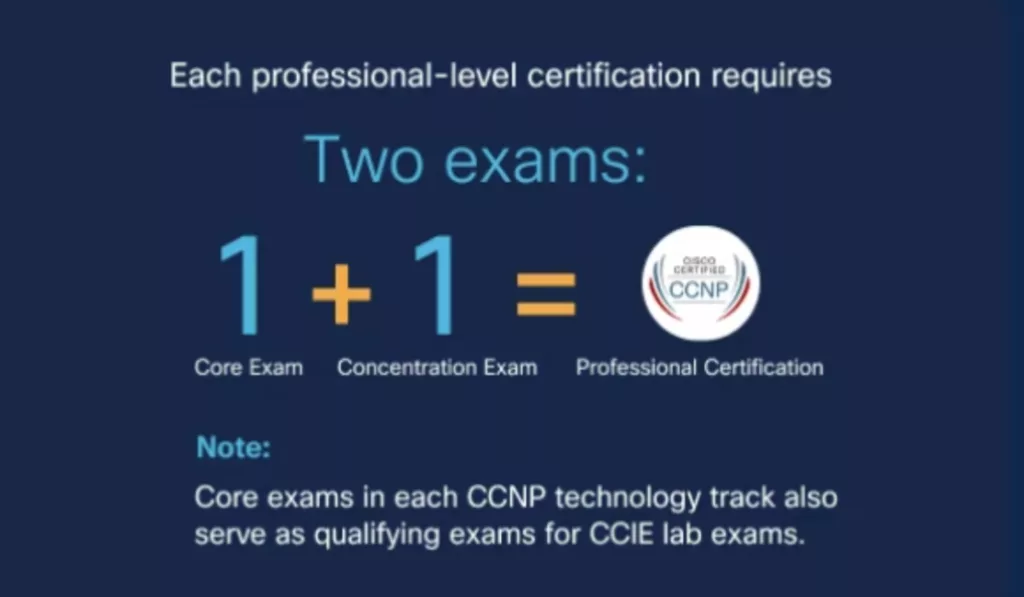Introduction
The Cisco Certified Network Professional (CCNP) is Cisco’s professional-level Certification for different IT job roles. It is a step above the popular associate-level certifications (CCNA, DevNet, CyberOps). This blog post is to help you navigate the different options available within the CCNP, and better understand the different types.

It will also explore the career opportunities for each CCNP, salaries, and basic information about the various exams for the certifications. You will learn to take advantage of your options and align them with your interests and career goals.
The CCNP comes in different flavors or specialties, depending on the focus or concentration. Each type will require a different set of exams, although they share some common core exams as the foundation.
The Target Audience For CCNP Certification
The CCNP is for persons who want to advance in their careers and exercise some level of expertise. Ideally, they must have had some years of experience (3-5 years) in the industry and are well knowledgeable in the foundational topics.
It is also recommended that you take one of the associate-level certifications (CCNA, CyberOps, or DevNet) before advancing to the professional CCNP certifications. There are officially no prerequisites in the new CCNP, as long as you can study the certification course materials and then pass the exams, you can become a CCNP.
Career Benefits of CCNP Certifications
The CCNP is not an easy certification, obtaining this professional certification will come with the following benefits.
- Skill Validation – It validates your skills at a professional level, which increases your perceived market value. Combined with suitable work experience, it will significantly advance your career.
- Higher Earning Potential – A CCNP certification increases your earning potential. A CCNP will significantly earn more than a CCNA on average.
- Increased Job Opportunities – the CCNP can increase the scope of jobs you can apply for, offering you more career opportunities. You typically will move from entry-level positions to mid-level and top-tier job positions.
- Recognition in the Industry – The CCNP is a respectable certification level within the industry and increases your overall value to prospective employers. It shows you have mastery of the concepts in your concentration or specialty.
- Within the Cisco ecosystem, the CCNP can be used to recertify your other certifications such as the associate-levels, and in part, towards the CCIE recertification.
CCNP Certification Tracks
To become a Cisco Certified Network Professional, Cisco demands that you must take two exams; The Core Exams which is a must for everyone, irrespective of the path/domain or niche you want to specialize in, and the Core exam, you choose at least one from the list of available Concentration exam.
Currently, there are 6 concentration exams to choose from, we will explore each of them shortly. This is a marked difference from the earlier stipulations(before Feb. 2020) from Cisco where you would typically have required 3-4 exams, including prerequisites from the associate levels to get any of the professional Certifications.

The CCNP Core Exams
There are different Cisco Core technologies and each of these has its own Core Exam. For example, We have a Data Center with its own Core Exam 350-601 DCCOR, Cisco Enterprise with its Core Exam as ENCOR 350-401, Security with Core Exam as SCOR 350-701, etc.
The Core Exam will focus on Implementing and Operating the particular Cisco Technologies. e.g., Implementing and Operating Cisco Enterprise Core Technology (ENCOR), Implementing and Operating Cisco Security Core Technology(SCOR), Implementing and Operating Cisco Data Center Core Technology (DCCOR), etc.
A breakdown of the different core exams, their exam codes, and domains are as follows;
- CCNP Enterprise
- CCNP Service Provider
- CCNP Data Center
- CCNP Security
- CCNP Collaboration
- Cisco Certified CyberOps Professional
- Cisco Certified DevNet Professional
It is a must to pass the exam as part of the criteria for becoming a CCNP in that domain. Each of the CORE exams is 120 mins in duration, with about 100 questions. Cisco has indicated that they will also be testing Practical Skills in the updated Exam, be sure to prepare adequately for some practical simulations. This Exam costs $400 and is valid for 3 years.
Cisco also makes the Core Exam in each CCNP technology track to serve as qualifying exams for the expert-level CCIE labs exams. This Core Exam is thus very important for ranking up within the Cisco Certification hierarchy.
1. CCNP Enterprise Core 350-401 ENCOR EXAM
The ENCOR 350-401 exam is on Implementing Cisco Enterprise Network Core Technologies. The primary focus is Routing and Switching, Wireless, and a bit of Automation. It is a combination of the old CCNP Routing and Switching and CCNP Wireless.
The CCNP enterprise is the starting point for many persons who are not sure of which track to follow. It covers a broad range of topics. Many of which are built on the foundational topics the CCNA teaches. The key sections in the ENCOR exam are
- Dual stack (IPv4 and IPv6) architecture
- Virtualization
- Infrastructure
- Network assurance
- Security
- Automation
The CCNP 350-401 is also the qualifying exam for the CCIE Enterprise Infrastructure and CCIE Wireless. (You only need to pass the corresponding Lab exam to be CCIE certified). The Exam is a 120 mins exam, with about 100 questions, testing on key 6 areas in the Implementing and Operating Cisco Enterprise Network Core Technologies.
The minimum score for passing the CCNP ENCOR Exam is about 825/100. (See table summary for exam topics, materials, and other details)
2. CCNP Data Center 350-601 DCCOR Exam

The DCCOR Exam is about Implementing and Operating Cisco Data Center Core Technologies. The focus technologies are on high-end Data Center Routers and Switches. Nexus Series Switches, Cisco MDS Switches, etc., as well as the Operating System for the Data Center technologies (NX-OS). The key sections in the DCCOR Exam include
- Network
- Compute
- Storage Network
- Security
- Automation
The exam fee is $400, Exam duration is 120 mins for about 100 questions. (See table summary for exam topics, materials, and other details)
3. CCNP Service Provider 350-501 SPCOR
This course is on Implementing and Operating Cisco Service Provider Network Core Technologies. e.g., Cisco Aggregation Service Routers. ASR (using Operating system IOSXR). You will gain skills to work with Service Providers Networking Infrastructure.
The exam also qualifies in part for the CCIE Service Provider. As a standalone, it qualifies you for the Cisco Certified Specialist (Service Provider Core Certification). The exam topics will cover the following key areas;
- Architecture
- Networking
- Services
- MPLS And Segment Routing
- Automation And Assurance
The exam fee is $400, Exam duration is 120 mins for about 100 questions. (See table summary for exam topics, materials, and other details)
4. CCNP Security 350-701 SCOR
The CCNP Security is about Implementing and Operating Cisco Security Core Technologies. The focus of the SCOR exam is on Cisco’s Security Technologies – The Cisco Adaptive Security Appliance (Cisco ASA Firewalls), Cisco FTD (Firepower Threat Defense) Firewalls, Identity Service Engine ICE, Email Security Appliance ESA, and Web Security Appliance WSA.
This exam is recommended for candidates who have had some experience in the industry and want to focus on preventing cyber attacks using Cisco’s technologies. (See table summary for exam topics, materials, and other details)
The Exam is $400, 120 minutes in duration, and will test your understanding and skill in the following areas;
- Security Concepts
- Network Security
- Content Security
- Securing The Cloud
- Endpoint Protection And Detection
- Secure Network Access, Visibility, And Enforcement
5. CCNP Collaboration 350-801 CLCOR

The CLCOR Certification is on Implementing Cisco Collaboration Core Technologies. Collaboration technologies allow us to live and work remotely. For example, Video conferencing, Internet telephoning as well as other technologies that make collaboration and remote working seamless.
This exam is $400, 120 mins for about 100 questions. The core areas on the exam are;
- Infrastructure and Design
- Protocols, Codecs, and Endpoints
- Call Control
- Quality of Service
- Cisco IOS XE Gateway and Media Resources
- Collaboration Applications.
6. Cisco Certified CyberOps Professional 350-201 CBRCOR
This is Cisco’s Cybersecurity solution. It builds on the foundation of the associate-level foundations. It focuses on Performing CyberOps operations using Cisco’s technologies.
Cisco is relatively new in the Cybersecurity domain but may eventually much Industry recognition in this domain. The key sections covered in the exam are ;
- Fundamentals
- Techniques
- Processes
- Automation
Like other CCNP Core Exams, it is $400, 120 minutes for about 100 questions.
7. Cisco Certified DevNet Professional 350-901 DEVCOR
The Cisco DevNet Professional is focused on Developing Applications Using Cisco Core Platforms and APIs. Cisco is big on Automation industry-wise and this exam, in combination with other Concentrations can help you gain such skills.
The DevCOR builds on the foundations of the DevNet Associate Certification. The Key sections covered in this Core Exam are as follows;
- Using APIs
- Cisco platforms
- Application deployment and security
- Infrastructure and automation
This exam is $400, 120 mins for about 100 questions.
The Concentration Exams
Each (Core) track of the CCNP has multiple concentration exams. You will need to pass 1 of them in addition to the Core Exam to be fully Certified CCNP. The concentration exams focus in-depth on a smaller segment within each domain or certification track.
You MUST have 1 Core Exam and 1 concentration exam to get the CCNP certification in any track. Combining two concentration exams does not add up to a CCNP.
Passing any of the concentration exams without the ENCOR exam makes you a Specialist in that Domain. You only become a Cisco Certified Network Professional by the Core and Concentration exams.
The Exam fee for each is $300 and the exam duration is 90mins
Career Opportunities with CCNP Certification

The different CCNP certifications are valid for different IT career jobs. Some of the typical jobs for each of the CCNPs are highlighted below;
The different CCNP certifications are valid for different IT career jobs. Some of the typical jobs for each of the CCNPs are highlighted below;
1. CCNP Enterprise
The CCNP Enterprise Certification will equip you to work in different capacities in IT. Some of these include
- Network/System Administrator
- Network Support Technician
- IT Specialist
- Systems Engineer
- Mid-level Network Engineer.
Salary range estimates in the US is $89,000 – 131,000/yr (Glassdoor, 2023)
2. CCNP Service Provider
This validates skills to work with Service Providers Network Infrastructure. Some of the typical job roles you can get with the CCNP Service provider certification include;
- Network Designer
- Senior Network Engineer
- Senior Systems Engineer
- Senior Network manager
- Senior Network Administrator.
Salary can estimated to be what the average Senior Network Engineer Earns; $123,786/yr.
3. CCNP Data Center
The CCNP Data Center certification validates skills that are required to work in the following roles
- Senior Data Center Engineer
- Network Administrator
- Consulting Systems Engineer
- Senior Network Designer
ZipRecruiter puts the average salary of CCNP Data Center in the US to be $147461 or $ 71/hr.
4. CCNP Security
The CCNP Security jobs are in the cybersecurity domains. Some of the typical jobs you can get with the CCNP Security include;
- Network Security Engineer
- Information Security Manager
- Information Security Analyst
- Associate Security Engineer
The average salary of a CCNP Security in the US is $152,770/yr or $73/hr
5. CCNP Collaboration
The career prospects for CCNP collaboration certifications will include working with collaboration technologies. Some examples of such job descriptions are;
- Collaboration Solutions Engineer
- Collaboration Administrator
- Collaboration Solution Architect.
The salary range typical for the Collaborations job description is $80,000 – 126,000/yr. (Glassdoor)
6. Cisco Certified CyberOps Professional
The CCNP CyberOps is geared towards security-related jobs. Some of the jobs that you can get with the certification include;
- Incident Manager
- Cybersecurity Engineer
- Security Specialist/ Cybersecurity Investigator
- Incident Responder
- Security Operation Center (SOC) Analyst
Salary for CCNP CyberOps will vary depending on the job description. ZipRecruiter puts the average for the CyberOps certification to be $122,108 /year in the US.
7. Cisco Certified DevNet Professional
The job opportunities for the Cisco DevNet Professional will be related to Development, Automation, and Design solutions. Some examples are;
- Senior Network Designer
- Senior Infrastructure Architect
- Senior Test Developer Engineer
- Network Automation Engineer (Senior)
- Senior Software Developer
The salary average in the US for a Cisco DevNet Professional is $129,348 /year ( ZipRecruiter)
Conclusions
The CCNP Certification is the Cisco professional-level certification. To be certified as a CCNP requires two exams, you pass one is the Core exam in a given track, and one concentration exam from the several that are available for each track.
The concentration exam equips you to gain the knowledge and skill required for Implementing and Operating Cisco Core while the concentration exam gives you mastery of a smaller niche. The CCNP Certification is widely regarded for a variety of job roles within the industry.
For more about the ENCOR Exams, Preparation, and materials check RECOMMENDED COURSES/BOOKS TO PASS CCNP ENCOR EXAMS (FREE AND PAID)




